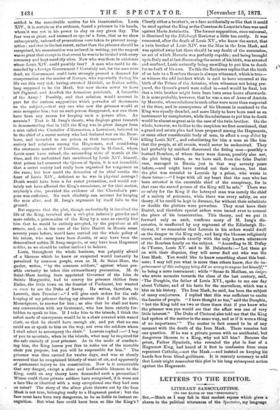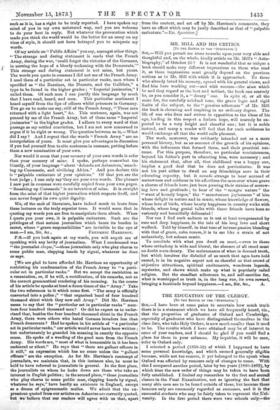LETTERS TO THE EDITOR.
LITERARY SANSCIJLOTTISM.
(TO TRH EDITOR Os THR " SPECTATOR:I
Six,—Much as I may fail in that modest repose which gives a charm to the political utterances of the Spectator, my language such as it is, has a right to be truly reported. I have spoken my mind of you in my own untutored way, and you are welcome to do your best in reply. But whatever the provocation which made you think the world would be the better for an essay on my vices of style, it should not have betrayed you to misquote any words.
Of my article on "Public Affairs" you say, amongst other things, " The strange and daring statement is made that the French Army, during the war, ' could forget the victories of the Germans, in nursing the hope of a bloody reckoning with the Democrats." This strange and daring statement is not mine, but yours. The words you quote in commas I did not use of the French Army. I used them of a particular set in particular ranks, men whom I Specified as " the Bazaines, the Ducrots, and the Gallifets," a type to be found in the higher grades ; " Imperial janissaries," I called them. Of such men I can justify this language by much that I have read, heard, and seen. This particular sentiment I heard myself from the lips of officers whilst prisoners in Germany. You go on to make me say, still of the French Army, "These men returned with a light heart," 8m. This sentence, again, was not penned by me of the French Army, but of these same "Imperial janissaries" in the higher grades. I adhere to every word of that passage as my settled conviction, but 1. tun not now concerned to argue if it be right or wrong. The question between us is,—What did I say ? And I repeat that the words " French Army " are an interpolation of yours. It must give you advantages in discussion if you feel yourself free to cite sentences in commas, putting before them a new nominative of your own.
Nor would it seem that your memory of your own words is safer than your memory of mine. I spoke, perhaps somewhat too bluntly, of your language "about ' delenda est Ashanteea,' smash- ing up Coomassie, and civilising Africa." And you declare this is "palpable caricature of your opinions." Of that you are the best judge ; I can only say-they are your own words. The phrases I now put in commas were carefully copied from your own pages. " Smashing up Coomassie" is no invention of mine. It is straight from the mint of that higher journalism which respects itself, and can never forget its own quiet dignity.
We, of the mob of literature, have indeed much to learn from these lectures on the truly superior tone. It would seem that in quoting my words you are free to manipulate them afresh. When I quote you your own, it is palpable caricature. Such are the privileges of that serious journalism which bears its burden in secret, whose " grave responsibilities " are invisible to the eye of
P.S.—If you look again at my words, you will acquit me of speaking with any levity of journalism. What I condemned was "the journalist claque,"—those journalists only who play chorus to some public man, clapping hands by signal, whatever he does or sap.
[We are glad to have afforded Mr. Harrison an•opportunity of restricting his condemnation of the French Army to " a parti- cular set in particular ranks." But we accept the restriction as a recantation, or, if he will, a rectification, of his remarks, not as the correct grammatical rendering of his meaning. Insthe course of his article he speaks at least a dozen times of the "Army." Take the two references to it which come first. "The army is officially converted into a police ;" "that organised band of four hundred thousand sbirri which they now call Army." Did Mr. Harrison mean to say that the " particular set in particular ranks " num- bers four hundred thousand men? Or did he expect us to under- stand that, besides the four hundred thousand sbirri in the French Army, there were others who hated German invaders less than French democrats ? Had he spoken in his article of "a particular set in particular ranks," our article would never have been written ; but unfortunately he guarded his meaning in exactly the opposite sense. He spoke of a weeding of the good men from the French Army. His words are, " most of what is honourable in it-has been cashiered or silent." He sass that "there are gallant officers in it still," an expression which has no sense unless the "gallant officers" are the exception. As for Mr. Harrison's contempt of journalists, we maintain that, in this instance also, he must be held to have referred to journalists in general. In the first place, the journalists on whom he looks down are those who take an interest in English politics ; in the second place, " those journalists who play chorus to some public man, clapping hands by signal, whatever he says," have hardly an existence in England, except as a dream of epigrammatic malice. We admit that the ex- pressions quoted from our articles on Ashantee are correctly quoted, but we believe that our readers will agree with us that, apart from the context, and set off by Mr. Harrison's comments, they have an effect which may be justly described as that of " palpable caricature."—En. Spectator.]



































 Previous page
Previous page